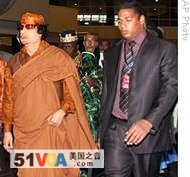Addis Ababa
04 February 2009
 |
| Libyan leader Moammar Gadhafi (L), escorted by bodyguard (R), arrives at the AU meeting in Addis Ababa, 01 Feb 2009 |
Meetings of African leaders usually run two days, but this summit in Addis Ababa dragged into a fourth day with members deadlocked over AU chairman Gaddafi's proposal for a central administration with sweeping powers. Most heads of state had departed by the time a compromise was struck that allowed Mr. Gaddafi to declare victory.
"It is a government of the union. It is an authority, a government. There will be secretaries ... coordinators for various policies, like defense and foreign affairs and defense policies and foreign policies that are divergent and we will coordinate everything and our defense policies for Africa," the Libyan president said.
Mr. Gaddafi admitted there are deep divisions among member states about his idea, but in a speech to the closing summit session, Mr. Gaddafi outlined a long-term vision of a fully united Africa, under one flag.
"We need the peoples of Africa, traditional forces of women and youth who can use their energies to push us to reach the final phase, which is the United States of Africa, which will be like the United States of America today," he said.
Special meeting planned
Mr. Gaddafi says a special meeting of African foreign ministers will be held in three months to discuss getting the union project off the ground.
But his high-profile optimism covered over the low-key determination of a majority of African leaders to kill, or at least indefinitely postpone the creation of a continental government.
Only a handful of heads of state were in the room to hear the Libyan leader's closing remarks. But most of Africa's big powers, such as Egypt, Ethiopia, Uganda, Kenya, Tanzania and South Africa are sticking to the position that it will not be a government with sovereign powers for the foreseeable future.
They left it to African Union Commission Chairman Jean Ping to explain to reporters that moving to a union government would be a long-drawn out process.
"The initial purpose was to transform into a government of union, then the member states during their discussions think government has a definition which is precise, and we have not yet reached that stage, and we better move from a commission to an authority," Ping said.
Long process lies ahead
Ping says even the small step of changing the name of the permanent secretariat from a commission to an authority, as agreed at this summit, could take years, because it requires a charter amendment that must be ratified by two-thirds of the member states.
This summit has left no doubt that Mr. Gaddafi is determined to set the wheels of a union government in motion during his one-year term as AU Chairman. But African diplomats and observers say the name change agreed to at this summit gives opponents of the plan the time they to delay it indefinitely.